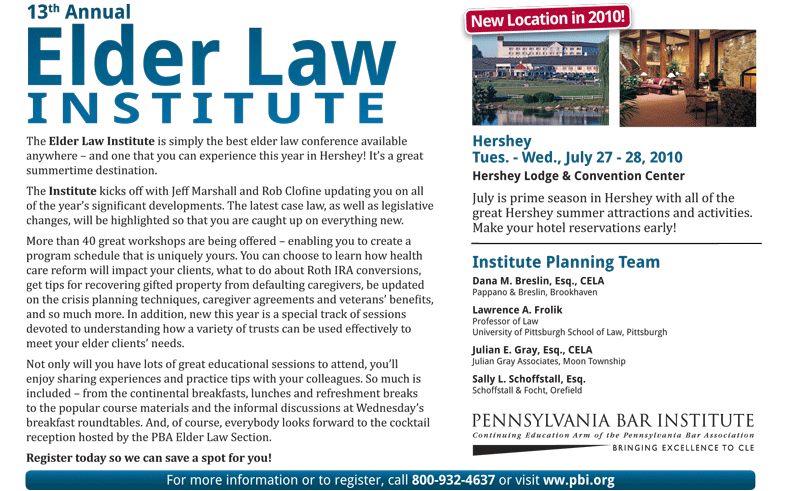
Final Form Assisted Living Regulations Approved by IRRC
Lancashire Hall v. Pennsylvania Department of Public Welfare Lancashire Hall Nursing & Rehabilitation Center v. Dep't of Public Welfare, decided May 27, 2010, involved a community spouse who purchased an annuity for herself with $98,763 of what would otherwise have been considered "excess resources." The annuity was not "DRA-compliant" and resulted in a denial of MA-LTC benefits. In other words, the annuity did not meet the annuity requirements of the Deficit Reduction Act of 2005 and was therefore deemed to be a "transfer for less than fair consideration," which resulted in the imposition of a penalty period of 415 days. The community spouse was estranged from the institutionalized spouse, who was himself mentally incapacitated, but those facts did not change the result. The Commonwealth Court upheld the Department's determination to deny benefits. Here is a link to the decision: Lancashire Hall Nursing & Rehabilitation Center v. Dep't of Public Welfare. Maloy v. Pennsylvania Department of Public Welfare Maloy v. Dep't of Public Welfare is a Commonwealth Court case decided on March 23, 2010, involving a dispute over the proper source of recovery for an admitted overpayment of MA-LTC benefits, deceased recipient's estate or transferee. Like the undisclosed asset transfers in Maloy, the decision itself was initially unreported, but a request was made by DPW lawyers that it be published. Here is a link to the decision: Maloy v. Dep't of Public Welfare. Checks Going Out to Seniors with High Drug Costs Seniors with high drug costs will start receiving one-time $250 "rebate" checks from the federal government beginning June 2010. The checks, which are a result of the new Health Care Reform laws, will go to Medicare drug plan enrollees who fall into the prescription drug coverage "donut hole." Here is how it works. Think you know someone who would like to receive this E-Newsletter? Just click your "Forward" button within this e-mail. Not a member of the Elder Law Section? For $35, PBA members can enjoy all the benefits of Elder Law Section membership, including this E-Newsletter, a newsletter and Listserv membership. To join click here. If you wish to unsubscribe to the PBA Elder Law Section E-Newsletter, click here. The Independent Regulatory Review Commission met publically on June 3 and approved the final form Assisted Living regulations (No. 14-514 (#2712) proposed by the Department of Public Welfare. "This rulemaking adds Chapter 2800 to 55 Pa. Code. The regulation implements Act 56 of 2007, which establishes licensure and operating standards for Assisted Living Residences. The goal of these residences is to provide an opportunity for residents to 'age in place' with support and supplemental health services." Here is a link to the final form regulations: Approved Final Form Assisted Living Regulations.
The Independent Regulatory Review Commission met publically on June 3 and approved the final form Assisted Living regulations (No. 14-514 (#2712) proposed by the Department of Public Welfare. "This rulemaking adds Chapter 2800 to 55 Pa. Code. The regulation implements Act 56 of 2007, which establishes licensure and operating standards for Assisted Living Residences. The goal of these residences is to provide an opportunity for residents to 'age in place' with support and supplemental health services." Here is a link to the final form regulations: Approved Final Form Assisted Living Regulations.
Robert C. Gerhard III is chair of the PBA Elder Law Section and editor of this E-Newsletter. If you have an article for an upcoming edition of our newsletter, please contact him at [email protected].
Practice Tips & Lancashire Hall Decision:
 1) Before purchasing an annuity, make sure that it is compliant with the Deficit Reduction Act of 2005.
1) Before purchasing an annuity, make sure that it is compliant with the Deficit Reduction Act of 2005.
Notably, and among other important requirements, the annuity must generally name the state as the
remainder beneficiary to the extent of medical assistance paid for the institutionalized individual,
second to a minor or disabled child. Otherwise, the purchase will be treated as a transfer and result
in a period of ineligibility for MA-LTC benefits. Read the DRA requirements carefully.
2) When it comes to making the computation of the community spouse's share of resources, unless a
couple is actually divorced, the assets of one are generally deemed to the other. (The retirement
account of the community spouse is an exception to that general rule.)
3) If a community spouse is refusing to cooperate, consider asserting "Spousal Refusal." The court
stated that it is not the caseworker's obligation to inform you of this opportunity. For more infor-
mation, see 42 U.S.C. �1396r-5 (c)(3)(A).
4) Note that in cases where benefits are denied due to an asset transfer, the applicant can 1) file and
appeal and 2) request a hardship waiver. (Do both.)
Robert C. Gerhard III is chair of the PBA Elder Law Section and practices elder law in Montgomery, Bucks and Philadelphia counties. He can be reached at [email protected] with questions or comments.
Practice Tips & Maloy Decision:
 1) A MA-LTC recipient has seven days to disclose changes in financial circumstances. Transferring
1) A MA-LTC recipient has seven days to disclose changes in financial circumstances. Transferring
real estate to one's self and mortgaging the real estate counts as such a change that must be brought
to the attention of the DPW income maintenance caseworker.
2) The Commonwealth can seek repayment of the overpayment of benefits due to undisclosed property
from any of the following: 1) the MA recipient, 2) the person receiving or holding such property, or
3) the MA recipient's estate and/or survivors benefiting from receiving such property. The decision
of the foregoing is the Commonwealth's choice, per Maloy. The court held that the "and/or" language
implies that the Legislature intended DPW to have wide latitude or broad discretion in choosing who
it will pursue, regardless of perceived inequities that may result.
Robert C. Gerhard III is chair of the PBA Elder Law Section and practices elder law in Montgomery, Bucks and Philadelphia counties. He can be reached at [email protected] with questions or comments.
Medicare Part D provides prescription drug benefits to Americans on Medicare. This benefit comes with a $310 initial deductible. After you've spent $310, you pay 25 percent of the cost of your prescriptions until the total cost of all the covered medicine you have received in a year hits $2,830. (The $2,830 represents the total cost of the medications including the amount paid by insurance, not just the portion you pay.)
 At that point, you are stuck with 100 percent of the costs of your drugs until the total cost of your medicines hits the catastrophic threshold of $6,440. This gap, when you pay 100 percent and Medicare pays nothing, is known as the "donut hole." In 2010, the donut hole totals $3,610 in drug costs that may end up being paid solely by you.
At that point, you are stuck with 100 percent of the costs of your drugs until the total cost of your medicines hits the catastrophic threshold of $6,440. This gap, when you pay 100 percent and Medicare pays nothing, is known as the "donut hole." In 2010, the donut hole totals $3,610 in drug costs that may end up being paid solely by you.
However, beginning this year, the newly enacted Health Care Reform law is starting on a path to eliminate the donut hole. In 2010, you will receive a $250 rebate from the government if you hit the donut hole. That check will be sent directly to you at your Social Security mailing address. There's no application process and no private companies will be involved in getting your rebate check to you. If anyone tries to charge you for help in getting your rebate, beware: It is a scam.
The rebate checks began going out on June 10 to individuals who already hit the donut hole earlier this year. Thereafter, checks will be sent out on a rolling basis as people's drug costs put them into the coverage gap. Checks will be sent to your mailbox. The money is tax free. Overall, it is anticipated that some 4 million seniors and disabled people will get rebate checks this year.
The 2010 rebate is only the first step toward closing the Medicare prescription drug coverage gap. Beginning in 2011, enrollees who hit the donut hole will receive a 50 percent discount on brand-name drugs and some Medicare gap coverage for generic drugs. Partial donut hole coverage for brand-name drugs begins in 2013. By 2020, the donut hole will be gone. Part D enrollees will then be responsible for only the standard 25 percent of the cost of both brand name drugs and generics until they reach the catastrophic limit where their co-pay is dramatically reduced: $2.40 per generic prescription filled and then either $6 per name-brand prescription filled or 5 percent of cost of name-brand prescription filled, whichever is higher.
Note that low-income Medicare beneficiaries who get "extra help" through the low-income subsidy program and are not subject to the donut hole will not receive a rebate check. However, PACE/PACNET members are eligible for the rebate as long as they don't also receive a low-income subsidy. To make sure Social Security has your correct home mailing address, you can call 1-800-772-1213.
Jeffrey A. Marshall is managing attorney of Marshall, Parker & Associates, which has offices in Jersey Shore, Williamsport, Wilkes-Barre and Scranton. He has been certified as an elder law attorney by the National Elder Law Foundation and can be contacted at [email protected].
